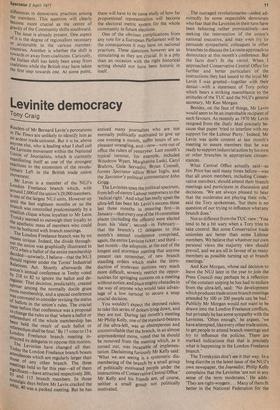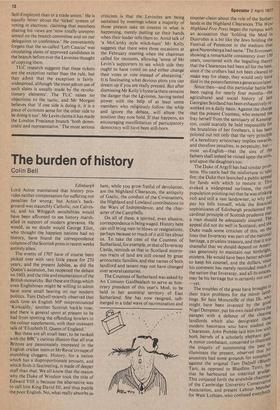Levinite democracy
Tony Craig Readers of Mr Bernard Levin's perorations in The Times are unlikely to identify him as an ardent trade unionist. But it is he, above anYone else, who is leading what shall call the Levinite movement within the National Union of Journalists, which is currently Manifesting itself as one of the strongest. reactions to the extremism of the revolutionary Left in the British trade union movement. Mr Levin is a member of the NUJ's London Freelance branch which, with around 2,000 of the union's 29,000 members, is one of the largest NUJ units. However up until the last eighteen months or so the branch was controlled predominantly by a smallish clique whose loyalties to Mr Leon Trotsky seemed to outweigh their loyalty to the apathetic mass of members who could not be bothered with branch meetings. The London Freelance branch was by no means unique. Indeed, the divide throughout the union was graphically illustrated in 1972 when a ballot of the entire membership decided—unwisely, I believe—that the NUJ should register under the Tories' Industrial Relations Act. Shortly afterwards the itlion's annual conference in Tenby voted by 218 to 82 to ignore the ballot and deregister. That decision, predictably, created Uproar among the normally docile grass Was membership, and a special conference 'as convened to consider revising the status Of ballots in the union's rules. The crucial lssue before that conference was a proposal to Change the rules so that 'where a ballot or !referendum of the whole membership has peen held the result of such ballot or .referendum shall be final.' By 17 votes to 15 a London Freelance branch meeting instructed its delegates to oppose this motion.
The Levinites have changed all that.
°clay the London Freelance branch boasts tattendances which are regularly larger than those of any other branch. The three rn ,....'eetings held so far this year—all of them nificant—have attracted respectively 200, and 115 branch members. In those nostat
gic days before Mr Levin cracked the Whip, 40 was a packed meeting. But he has
enticed many journalists who are not normally politically motivated to give up one evening a month, suffer hours of unpleasant wrangling, and—now—vote out of office the rulers of yesteryear. Last month's typical turnout, for example, included Woodrow Wyatt, Marghanita Laski, Caryl Brahms, Gaia Servadio, Bryan Connell, former Spectator editor Brian Inglis, and the Spectator's political commentator John Grigg.
The Levinites span the political spectrum, from left-of-centre Labour supporters to the 'radical right.' And what has really upset the ultra-left has been Mr Levin's success these last three months in ensuring first—in January—that every one of the 16 committee places (including the officers) were elected from his 'slate' ; second—in February— that the branch's 12 delegates to this month's annual conference comprised, again, the entire Levinite ticket; and third— last month—the adoption, at the end of the longest and stormiest meeting that anyone present can remember, of new branch standing orders which make the introduction of irrelevant motions very much more difficult, severely restrict the opportunities for springing motions on a meeting without notice, and place mighty obstacles in the way of anyone who would take advantage of a low turnout to secure a snap crucial decision.
You wouldn't expect the deposed rulers to take this series of defeats lying down, and they are not. During last month's meeting Mr Philip Kelly, one of the standard-bearers of the ultra-left, was so obstreperous and uncontrollable that the branch, in an almost unprecedented move, voted that he should be removed from the meeting which, as it turned out, was incapable of implementation. Declaiming furiously Mr Kelly said : 'What we. are seeing is a systematic dismembering of the branch by a small group of politically motivated people under the instructions of Conservative Central Office.' Mr Kelly and his friends are, of course, neither a small group
not politically motivated. The outraged revolutionaries—aided admittedly by some respectable democrats who fear that the Levinites in their turn have been behaving rather provocatively—are seeking the intervention of the union's national executive, and may even try to persuade sympathetic colleagues in other branches to discuss the Levinite approach to democracy at this month's conference. But the facts don't fit the vitriol. When I approached Conservative Central Office for further and better particulars of the instructions they had issued to the loyal Mr Levin I was greeted—together with their denial—with a statement of Tory policy which bears a striking resemblance to the attitudes of the TUC and the NUJ's general secretary, Mr Ken Morgan.
Besides, on the face of things, Mr Levin would seem to be an improbable recipient of such favours. As recently as 1970 Mr Levin
resigned from the Daily Mail precisely because that paper 'tried to interfere with my
support for the Labour Party.' Indeed, Mr Levin was quite content at last month's meeting to assure members that he was ready to support industrial action by his own or other branches in appropriate circumstances.
What Central Office actually said—as Jim Prior has said many times before—was that all union members, including Conser vative members, should attend their branch meetings and participate in discussion and decisions. 'We are always pleased to hear that the moderates are playing their role,' said the Tory spokesman, 'but there is no question of our trying to influence what any branch does.'
Not so different from the TUC view: 'You tend to be a bit wary when a Tory tries to take control. But some Conservative trade unionists are better than some Labour members. We believe that whatever our own personal views the majority view should prevail, and we are all in favour of as many members as possible turning up at branch meetings.'
And Ken Morgan, whose sad decision to leave the NUJ later in the year to join the Press Council may perhaps be a reflection of the constant sniping he has had to endure from the ultra-left, said: 'No development whichproduces trade union branch meetings attended by 100 or 200 people can be bad.' Publicly Mr Morgan would not want to be drawn into the London Freelance conflicts, but privately he has some sympathy with the Levinites. 'Often enough,' he argues, 'we have attempted, like every other trade union, to get people to attend branch meetings and try to influence the policies. There are marked indications that that is precisely what is happening in the London Freelance branch.'
The Trotskyists don't see it that way. In a long diatribe in the latest issue of the NUJ's
own newspaper, the Journalist, Philip Kelly
complains that the Levinites 'are not in any sense of the term moderates.' He adds : 'They are right-wingers ... Many of them fit better in the National Federation for the Self-Employed than in a trade union.' He is equally bitter about the 'ticket' system of voting in elections, claiming that members sharing his views are 'now totally unrepresented on the branch committee and on our delegation to conference.' He conveniently forgets that the so-called 'Left Caucus' was circulating slates of approved candidates in the branch before ever the Levinites thought of copying them.
TUC research suggests that these tickets are the exception rather than the rule, but they admit that the exception is fairly widespread, although 'the most adroit use of such slates is usually made by the revolutionary elements'. The TUC raises no objections to the tactic, and Mr Morgan believes that 'if one side is doing it, it is a piece of common sense for the other side to be doing it too'. Mr Levin claims it has made the London Freelance branch 'both democratic and representative.' The most serious criticism is that the Levinites are being sustained by meetings where a majority of those present take an interest in what is happening, merely putting up their hands when their leader tells them to. Amid talk of 'a McCarthy style witch-hunt' Mr Kelly suggests that there were three occasions at the February meeting when the chairman called for recounts, allowing 'some of Mr Levin's supporters to see which side they ought to have voted on and either change their votes or vote instead of abstaining.' It is fascinating what devious plots you can dream up if you are really pressed. But after dismissing Mr Kelly's hysteria there remains the danger that the Lgvinites, having tasted power with the help of at least some members who religiously follow the whip and ignore the debate, will abuse the position they now hold. If that happens, an encouraging manifestation of participatory democracy will have been still-born.







































 Previous page
Previous page